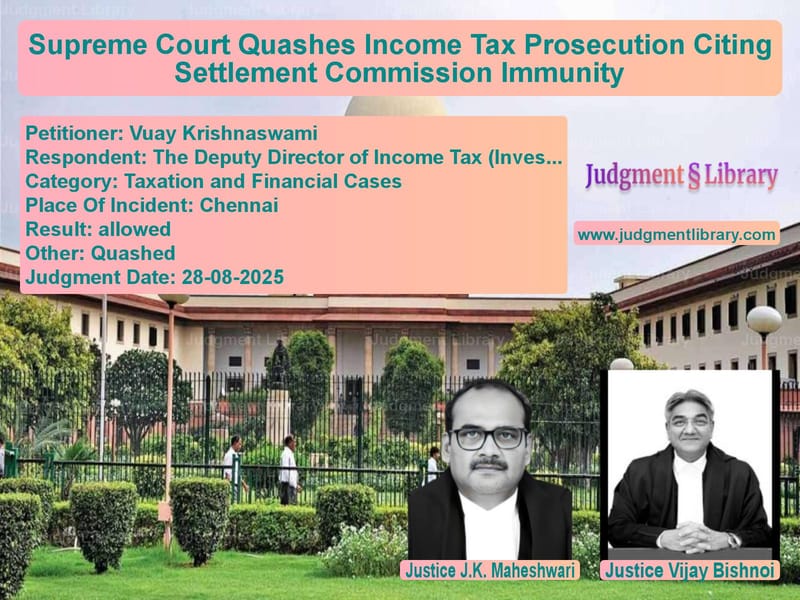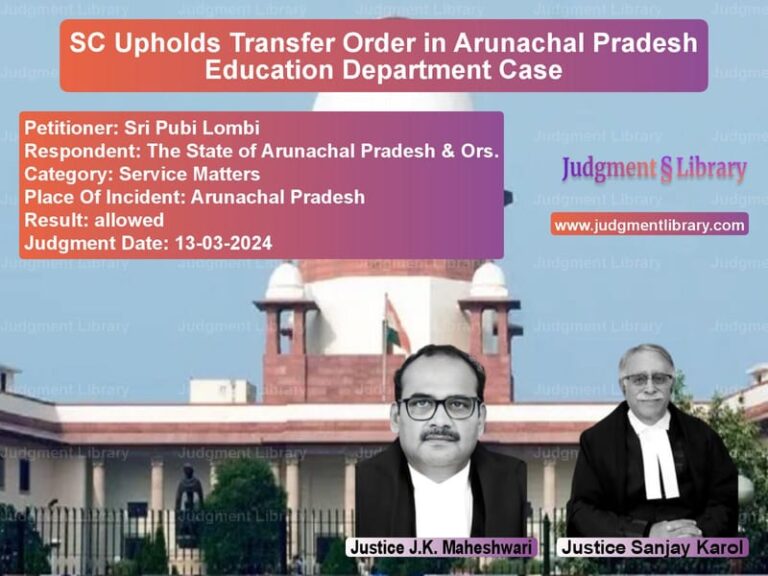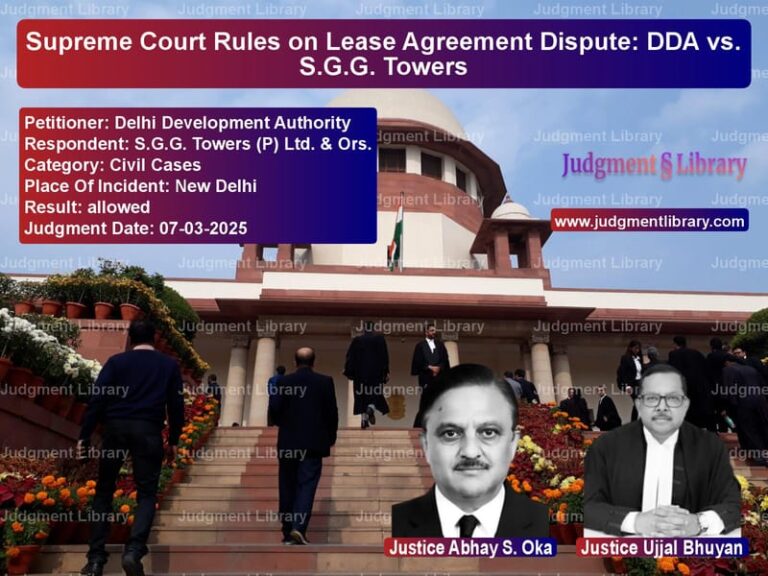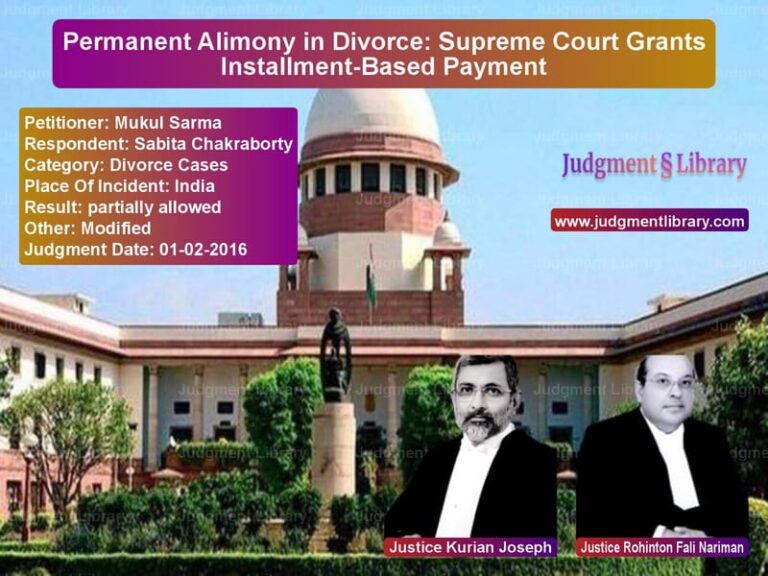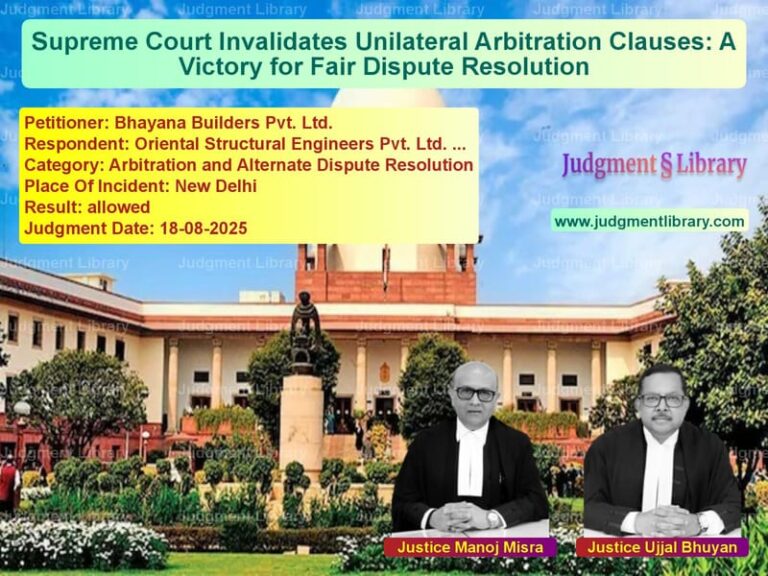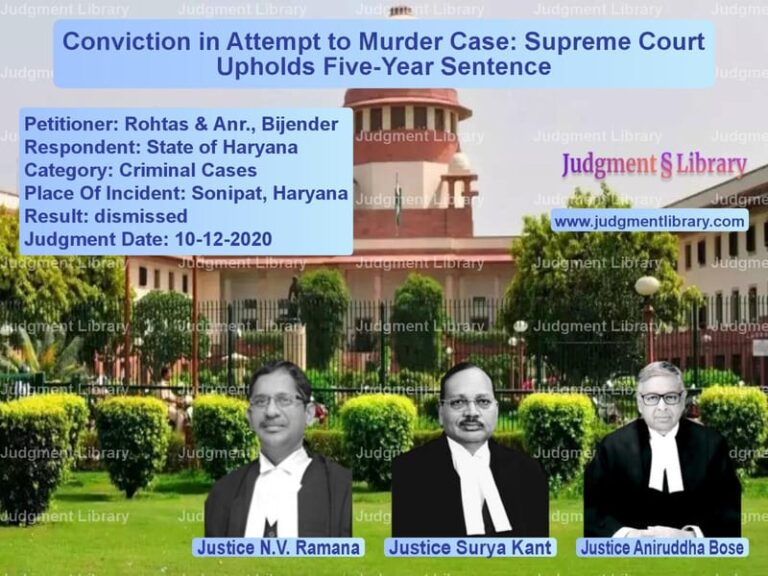Supreme Court Quashes Income Tax Prosecution Citing Settlement Commission Immunity
In a significant ruling that reinforces the importance of procedural fairness in tax administration, the Supreme Court of India recently delivered a judgment that highlights the binding nature of departmental circulars and the conclusive effect of Settlement Commission orders. The case involving Vuay Krishnaswami and the Deputy Director of Income Tax presents a compelling narrative about the delicate balance between revenue enforcement and taxpayer rights, particularly when statutory settlement mechanisms have been invoked. The judgment, delivered by Justice J.K. Maheshwari and Justice Vijay Bishnoi, examines the complex interplay between prosecution provisions under the Income Tax Act and the immunity powers of the Settlement Commission, ultimately coming down strongly in favor of procedural compliance and fairness.
The legal dispute originated from a search conducted at the appellant’s residence on April 24, 2016, where unaccounted cash of Rs. 4,93,84,300 was seized. This led to the initiation of prosecution proceedings against the appellant under Section 276C(1) of the Income Tax Act, which deals with wilful attempt to evade tax. However, the case took a significant turn when the appellant approached the Settlement Commission, disclosing additional income and seeking immunity from both penalty and prosecution. The Settlement Commission, in its order dated November 26, 2019, granted immunity from penalty but refrained from granting immunity from prosecution due to the pending quashing petition before the High Court. This created a legal conundrum that eventually reached the Supreme Court for resolution.
The Legal Battle and Arguments
The appellant’s senior counsel, Mr. Preetesh Kapur, presented several compelling arguments before the Supreme Court. He emphasized that the order passed by the Settlement Commission under Section 245D(4) should be conclusive as per Section 245-I of the Income Tax Act, which states that “every order of settlement passed under sub-section (4) of section 245D shall be conclusive as to the matters stated therein and no matter covered by such order shall, save as otherwise provided in this Chapter, be reopened in any proceeding under this Act or under any other law for the time being in force.” This provision, he argued, gave finality to the Settlement Commission’s findings.
Furthermore, the appellant challenged the very initiation of prosecution, pointing to various departmental circulars that mandated specific procedures before launching prosecution. The circular dated April 24, 2008, specifically stated that “all cases where penalty u/s 271(1)(C) exceeding Rs.50,000/- is imposed and confirmed by the ITAT shall be processed for filing prosecution complaint. The case for prosecution under this section shall be processed by the A.O. preferably within 60 days of receipt of the ITAT’s order.” Similarly, the Prosecution Manual of 2009 advised that “initiation of prosecution under section 276C(1) only after confirmation of concealment penalty by the ITAT.” The 2019 CBDT circular further reinforced these requirements, specifying that cases where the amount sought to be evaded is Rs. 25 lakhs or below should not be processed for prosecution except with previous administrative approval of the Collegium.
The Revenue, represented by Ms. Nisha Baghchi, countered these arguments by emphasizing that the complaint was filed before the appellant’s application to the Settlement Commission. She relied on the first proviso to Section 245H(1), which states that “no such immunity shall be granted by the Settlement Commission in cases where the proceedings for the prosecution for any such offence have been instituted before the date of receipt of the application under section 245C.” This, she argued, saved the prosecution from being affected by the subsequent settlement proceedings.
The Court’s Analysis and Reasoning
The Supreme Court conducted a comprehensive analysis of the legal framework, beginning with the historical context of the settlement mechanism. The Court noted that Chapter XIXA of the Income Tax Act, dealing with settlement of cases, was inserted based on the recommendations of the Wanchoo Committee (Direct Taxes Enquiry Committee) of 1971. The Court reproduced the Committee’s observations that “in the administration of fiscal laws, whose primary objective is to raise revenue, there has to be room for compromise and settlement. A rigid attitude would not only inhibit a one-time tax-evader or an unintending defaulter from making a clean breast of his affairs, but would also unnecessarily strain the investigational resources of the Department.”
The Court then examined the binding nature of departmental circulars, referencing several precedents. In Ranadey Micronutrients Vs. CCE, the Court had held that “There can be no doubt whatsoever that after 21-11-1994, excise duty could be levied upon micronutrients only under the provisions of Heading 31.05 as ‘other fertilisers’. If the later circular is contrary to the terms of the statute, it must be withdrawn. While the later circular remains in operation the Revenue is bound by it and cannot be allowed to plead that it is not valid.” Similarly, in Paper Products Ltd. Vs. CCE, the Court observed that “the circulars issued under Section 37-B of the said Act are binding on the Department and the Department cannot be permitted to take a stand contrary to the instructions issued by the Board.”
The Court made a crucial observation about the Settlement Commission’s order, noting that it had specifically found that “the applicant has disclosed all the facts, material to the computation of his additional income. Thus, the applicant has fully satisfied the provisions of section 245H. The overall additional income is not on account of any suppression of any material facts in the application. The additional income offered does not disclose any variance from the manner in which the additional income had been earned.” This finding, the Court emphasized, was conclusive under Section 245-I of the Act.
The Final Judgment and Its Implications
The Supreme Court ultimately ruled in favor of the appellant, holding that “the prosecution lodged with the help of proviso to sub-section (1) to Section 245H was in defiance to the circular dated 24.04.2008, which was in vogue. It was the duty of the PDIT and DDIT to look into the facts that in absence of any findings of imposition of penalty due to concealment of fact, the said prosecution cannot be proved against the assessee.” The Court strongly criticized the Revenue’s conduct, stating that “Such an act cannot be construed in right perspective and the Revenue have acted in blatant disregard to binding statutory instructions. Such willful non-compliance of their own directives reflects a serious lapse, and undermines the principles of fairness, consistency, and accountability, which in any manner cannot be treated to be justified or lawful.”
The Court quashed the prosecution proceedings and imposed costs of Rs. 2,00,000 on the Revenue, payable to the appellant. In its concluding remarks, the Court emphasized that “the conduct of the authorities lacks fairness and reasonableness, and the High Court’s approach appears to be entirely misdirected, having failed to appreciate the factual and legal position in right earnest.”
This judgment serves as an important reminder about the binding nature of departmental circulars and the conclusive effect of Settlement Commission orders. It reinforces the principle that tax administration must balance revenue collection with procedural fairness and consistency. The decision also highlights the importance of the settlement mechanism as a tool for resolving tax disputes efficiently, without necessarily resorting to prolonged prosecution proceedings. For taxpayers, this judgment provides significant protection against prosecution when they have voluntarily disclosed their income through the proper settlement channels and complied with all requirements. For the tax administration, it underscores the importance of adhering to their own guidelines and procedures, ensuring that prosecution is reserved for appropriate cases where there is genuine wilful evasion rather than technical defaults.
Petitioner Name: Vuay Krishnaswami.Respondent Name: The Deputy Director of Income Tax (Investigation).Judgment By: Justice J.K. Maheshwari, Justice Vijay Bishnoi.Place Of Incident: Chennai.Judgment Date: 28-08-2025.Result: allowed.
Don’t miss out on the full details! Download the complete judgment in PDF format below and gain valuable insights instantly!
Download Judgment: vuay-krishnaswami-vs-the-deputy-director-supreme-court-of-india-judgment-dated-28-08-2025.pdf
Directly Download Judgment: Directly download this Judgment
See all petitions in Income Tax Disputes
See all petitions in Tax Evasion Cases
See all petitions in Banking Regulations
See all petitions in Tax Refund Disputes
See all petitions in Customs and Excise
See all petitions in Judgment by J.K. Maheshwari
See all petitions in Judgment by Vijay Bishnoi
See all petitions in allowed
See all petitions in Quashed
See all petitions in supreme court of India judgments August 2025
See all petitions in 2025 judgments
See all posts in Taxation and Financial Cases Category
See all allowed petitions in Taxation and Financial Cases Category
See all Dismissed petitions in Taxation and Financial Cases Category
See all partially allowed petitions in Taxation and Financial Cases Category

